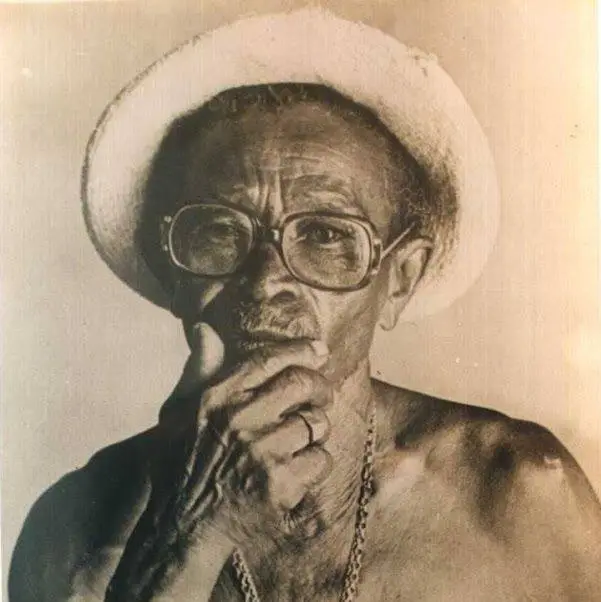Mestre Besouro Mangangá
- Lived in: Santo Amaro, Bahia, Brasil
- Date of Birth: 01-Jan-1895
- Date of Death: 01-Jan-1924
- Learned from: Mestre Tio Alipio
- Capoeira Style: Capoeira
Biography:
Besouro Mangangá, born Manoel Henrique Pereira in Santo Amaro da Purificação, Bahia, is one of the most legendary and mythologized figures in the history of Capoeira. Revered for his extraordinary skill, fearlessness, and spiritual aura, Besouro became a symbol of resistance, freedom, and ancestral power within the art. His nickname, Besouro (beetle), refers to the mangangá, a large and feared beetle in Bahia, reflecting both his resilience and his mythical ability to escape danger.
Early Life and Formation
Raised in the sugarcane region of Bahia, an area deeply rooted in Afro-Brazilian culture, Besouro was introduced to capoeira at a young age. According to several accounts, he learned capoeira in the region of Trapiche de Baixo under Mestre Alípio, before the formalization of Capoeira Angola and Capoeira Regional by Mestre Pastinha and Mestre Bimba. Writer Liberac notes that Besouro trained capoeira before the era of both Pastinha and Bimba, placing him firmly within the tradition of Capoeira Antiga.
From early on, Besouro gained a fearsome reputation. He was known not only as an exceptional capoeirista but also as a faquista, highly skilled in knife and razor fighting. One of his most famous abilities was playing capoeira while holding a razor between his toes — a testament to his balance, agility, and lethality.
Skill, Conflict, and Reputation
Besouro became widely known for his confrontations with police and authority figures. According to oral history, he was never defeated by the police and often used capoeira techniques combined with blades to overpower his opponents. Despite this reputation, he was not remembered as a criminal, but rather as a protector of himself, his community, and the capoeira tradition during a period of intense repression.
Folklorist Edison Carneiro described him as:
“The most famous national capoeirista, coming from Santo Amaro… unbeatable. To this day, capoeira songs portray his legendary strength: he was a master above masters.”
Capoeira songs continue to immortalize him:
Meu mestre foi Mangangá
Na roda que ele esteve
Outro mestre lá não há
Myth, Spirituality, and Corpo Fechado
Besouro’s legend extends deeply into the spiritual realm. Many believed he possessed corpo fechado — a ritual spiritual protection that rendered him invulnerable to bullets and blades. His only widely recognized student, Mestre Cobrinha Verde, explained that Besouro earned his nickname because people believed that when surrounded by overwhelming enemies, he could transform into a beetle and fly away.
Several mestres of later generations reinforced this mythical image. Mestre João Pequeno, student of Mestre Pastinha, stated that Besouro was his father’s cousin and that stories of Besouro’s courage inspired him to pursue capoeira. João Pequeno learned many of these stories from Mestre Juvenço, a blacksmith and close friend of Besouro, who also recounted details of his death.
Students and Influence
Among those who claimed direct connection to Besouro was Mestre Rafael (Rafael Alves França), born in Santo Amaro. Mestre Rafael stated that Besouro was his first teacher and that it was Besouro himself who gave him the nickname Cobrinha Verde, referencing his agility, intelligence, and resourcefulness. Rafael also trained with other notable figures of the era, including Maitá, Licurí, Joité, Dendê, Gasolina, Siri de Mangue, Doze Homens, Espiridião, Juvêncio Grosso, Espinho Remoso, Neco, Canário Pardo, and Tonha — reflecting the communal and fluid nature of capoeira transmission at the time.
Death
Besouro Mangangá was killed in 1924, still very young, in the region of Maracangalha, Santo Amaro. His death is surrounded by multiple versions and legends. One widely told account states that his enemies used a special wooden dagger, ritually prepared to bypass his corpo fechado. Another version claims he unknowingly carried a written message marking him for ambush, being illiterate and unaware of its contents.
Regardless of the version, his death shocked the capoeira world. According to oral tradition, capoeira rodas across Bahia ceased for weeks in mourning.
Legacy and Cultural Impact
After his death, Besouro’s fame only grew. By the 1930s, he had become a national symbol of capoeira, and as the art spread internationally, his legend followed. Today, Besouro stands as one of the most powerful representations of capoeira’s ancestral roots — embodying physical mastery, spiritual protection, and resistance against oppression.
In 2009, his life was dramatized in the film Besouro (released internationally as The Assailant), starring Aílton Carmo, with choreography by Huan-Chiu Ku, introducing his story to a new generation.
Conclusion
Besouro Mangangá was more than a master capoeirista — he was a cultural force. Straddling the line between history and myth, his life reflects the soul of capoeira itself: resistance, spirituality, cunning, and freedom. To this day, his name resonates in songs, stories, and rodas around the world, ensuring that Besouro Mangangá remains eternal in the memory of capoeira.
